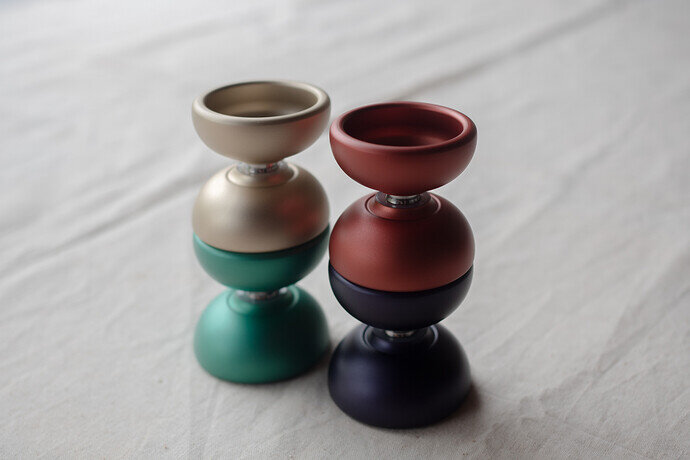Goji
This has been a crazy month for us, having just released the Gravity with Round Spinning Objects. That was a whirlwind, and we’re incredibly grateful for all of your support.
All the same, we’re very excited and proud to announce something that has been in the works for a long time.
Say hello to the Goji.
SPECS
dia 52.5mm
wid 49.7mm
weight 63.5g
material 7068 AL
If you’ve been on this thread at all, you’d know that our design process always begins with some acknowledgement of history. That is usually where we begin, and our hope is that by the end of each design cycle we have added on to the body of work that has come before.
The Cloudberry was our attempt to saddle lightness and power and to find its place a long line of great organics; the Pomelo an oversized featherweight that pays homage to the fat, chunky designs of the 2000-2010s era.
The Goji begins with the lineage of great undersized organics. It is easy to call to mind which they are, because they’ve been and remained iconic throughout the years – Yoyofactory’s 888, Caribou Lodge’s Wooly Marmot, and Anti-Yo’s Bapezilla remain some of the most emblematic and enduring instances, and in my view, this lineage is continued today in wonderful designs in One Drop and Static Co.'s Parlay and Sudo, and A-RT’s Sparrow, amongst a few others.
The challenges for us in putting out something we felt could stand amongst such storied designs were in adapting the classical shape and specifications for modern play. Undersized designs are sometimes limited in spin power and stability. That “sensitivity” to off-axis movement is part of the joy that accompanies small and round return tops.
At the same time, we wanted the experience of someone using the Goji to be as thoughtless, free, and unexacting on the player as possible – something you could just comfortably jam with, without it requiring too much care and focus.
We wanted to take the intensity and intentionality of honing a player’s precision out of the experience, and provide something more fun, more effortless.
Our first prototype weighed in at 66.6g. It was a total spin machine.
Isaac Sams is someone we’ve had the privilege of helping us test early iterations of our designs. Of the Cloudberry, Thunderberry, Pomelo and the Goji, he wrote back saying the Goji was his favourite – that was quite an affirming moment for us.
Still, I personally felt it overpowered the Thunderberry, which was an interesting and exciting experience in itself – it could just go on and on. It reminded me of the Bapezilla 2, which felt thunderous in playfeel despite having an unassuming profile.
Power wasn’t an issue, but its nimbleness was.
An early design prompt that was core to the process of creating the Goji was that it had to feel like it could “run” on the string.
An early working title for the project before we settled on a final name was Peter Rabbit, which was meant to help us visualise the sort of liveliness it should have in play. If you’ve ever seen old videos of Jensen Kimmitt trick-shredding on a Wooly Marmot in that inimitable hop-style, you’d have a sense of what we were fixated on.
We took a month off design work to play and test the Goji, so we could find clarity in what we wanted to keep, and what we’d take off the board.
We liked the Goji’s profile, and so we retained its silhouette completely intact, but we eventually overhauled its entire weight distribution. After reconstructing its rim and cup, the design turned out 3.1g lighter, which is a significant mass for any return top, much less one this small.
Prototype II came back possessing that very litheness on the string. It isn’t as powerful as Prototype I, but still has enough juice to get through most modern tricksets.
It’s not meant for competition in the slightest, but if kicking back and jamming for hours is something that sounds like a good idea to you, you might just like the Goji.
This thing just sprints across string.
As always, thank you for getting to the end of another of these very long posts. If you have any thoughts or comments, I’d absolutely love to hear what you think!
·
may 2021
·

